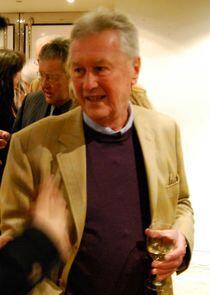
Brian Hodgson
Earlier, in 1966, with fellow workshop musician Delia Derbyshire and EMS founder Peter Zinovieff, he helped set up Unit Delta Plus, an organisation which they intended to use to create and promote electronic music. Based in a studio in Zinovieff's townhouse in Putney, they exhibited their music at a few experimental and electronic music festivals, including The Million Volt Light and Sound Rave at which The Beatles' "Carnival of Light" had its only public playing. After a troubled performance at the Royal College of Art, in 1967, the unit disbanded.
Also in the late sixties, Hodgson and Derbyshire, along with fellow musician David Vorhaus, set up the Kaleidophon studio in Camden Town. The studio produced electronic music for London theatre productions and, in 1968, the three partners used it to produce their first album as the band White Noise. Although later albums were essentially solo Vorhaus albums, the debut, An Electric Storm featured collaborations with Hodgson and Derbyshire and is now considered an important and influential album in the development of electronic music.
During this period the trio also contributed, using pseudonyms, to the Standard Music Library. Many of these recordings, including compositions by Hodgson using the name "Nikki St George", were later used on the seventies ITV science fiction rivals to Doctor Who; The Tomorrow People and Timeslip.
After leaving the Radiophonic Workshop, Hodgson set up the Electrophon studio in an ex-fruit warehouse at 8 Neal's Yard, Covent Garden. Hodgson withdrawing his BBC pension of around "two thousand pound" set up the studio with Delia Derbyshire, who contributed a single tape recorder. Delia in a "depressive state" soon left and it was a chance encounter with music composer John Lewis seeking Brian's advice on purchasing a synthesiser that lead to Lewis joining Hodgson. The pair under the duo 'Wavemaker' composed and produced two electronic albums for Polydor, 'Where Are We Captain?' in 1975 and 'New Atlantis' in 1977 which were reviewed favourably in the press.
In 1973, he worked with the Doctor Who composer Dudley Simpson, under the name "Electrophon", on the album In A Covent Garden (sometimes credited to "The Unexploded Myth"). It featured Hodgson and Simpson's arrangements of several classical compositions for synthesisers and a 16 piece orchestra. Their versions of Tchaikovsky's None But the Weary Heart and Debussy's "La fille aux cheveux de lin" later appeared in the Doctor Who serial "The Robots of Death". The duo also released the albums Zygoat in 1972, credited to the American composer for dance Burt Alcantara, and Further Thoughts On the Classics, in 1974. Besides records, Hodgson also spent his time at the studio writing scores for ballet and film including, with Derbyshire, the music for the 1973 horror film The Legend of Hell House.
In 1977, leaving the Electrophon studio in the hands of John Lewis, he returned to the Radiophonic Workshop to replace Desmond Briscoe as its organiser. In 1983, he became the head of the department, remaining there until circumstances forced him to resign in 1995.
In 1983, he appeared at Doctor Who's 20th Anniversary celebrations at Longleat alongside many cast and crew from the series.
Biography from the Wikipedia article Brian Hodgson. Licensed under CC-BY-SA. Full list of contributors on Wikipedia.
Part of Crew
Recently Updated Shows

The Creep Tapes
Based on a collection of videotapes in the secret vault of the world's deadliest and most socially uncomfortable serial killer, who hires his victims to film him for the day under false pretenses, each episode exposes a new victim from one of the fabled 'Creep Tapes'.

America's Funniest Home Videos
ABC's longest-running primetime entertainment show, America's Funniest Home Videos, returns for season 36 this fall with the same mission -- giving families something genuinely funny to enjoy together on Sunday nights.
"AFV," the longest-running primetime entertainment show in ABC history, returns for season 36 with the same mission - to provide viewers with hysterical moments that fly by at a dizzying pace.

The Real Housewives of Potomac
Just up the river from our nation's capital lies a hidden gem—Potomac, Maryland. Its rolling hills, gated mansions, sophisticated prep schools, and exclusive country clubs all serve to keep the area invitation-only. Sprinkled throughout this community are a handful of old-line, wealthy African-American families who have historically broken racial barriers to provide a life of privilege for their children. The Real Housewives of Potomac follows the upscale lives of six intriguing, well-to-do women: Gizelle Bryant, Katie Rost, Karen Huger, Charrisse Jackson-Jordan, Robyn Dixon, and Ashley Darby, all of whom have fought for their places in this society by way of legacy or marriage. In a town where entry is granted only through class, pedigree, and lineage, how far will these ladies go to secure their spot at the top of this prestigious circle?

The Traitors Canada
Follow a group of contestants – including some familiar faces – who live together as they complete a series of challenges with the goal of earning a cash prize. The catch? Some of the contestants are traitors who will attempt to deceive and manipulate their way to the prize instead of sharing it amongst the group. In this psychological adventure will the traitors be unmasked in time?

